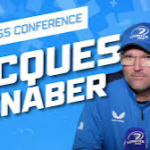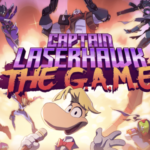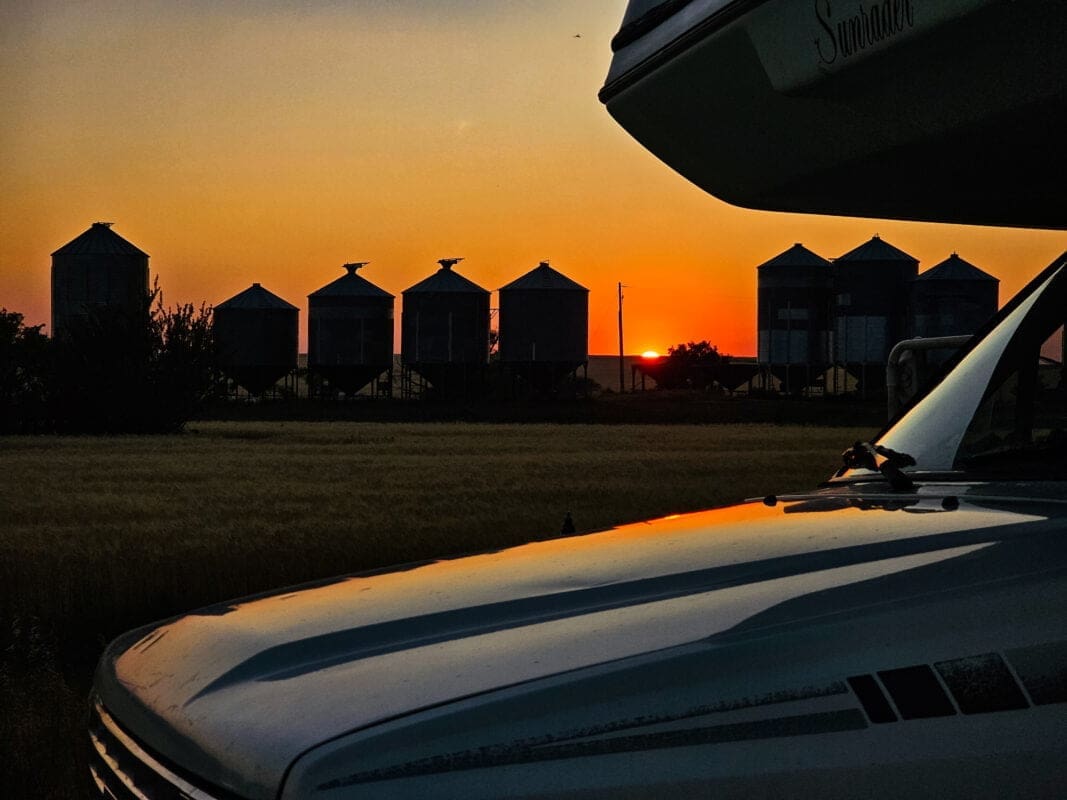
Not many people talk about the wonders of a Saskatchewan road trip, but clearly, they didn’t get very far off the Trans-Canada Highway. We started our Saskatchewan road trip from the far north of the province because we knew it had vast boreal forests, glacial lakes, and some of the world’s oldest rock formations. Working our way south, we reached the prairie land Saskatchewan is known for, but that was full of surprises too—from artsy towns to rare wilderness.
The Grasslands is the world’s most endangered ecosystem, with rare animals, 10,000 years of human history, and dinosaur fossils in droves! Having driven 1,800 kilometers of the province from top to bottom, we came to appreciate both sides of this under-rated province and know you’ll love it too. Discover the best things to do with our Saskatchewan road trip planner.
Saskatchewan Road Trip Route
In the summer of 2023, we did a massive seven-province Canada overlanding journey, heading from the far east of Newfoundland & Labrador to our grand finale in Saskatchewan. All roads in Manitoba want to send you straight into Southern Sask but we decided to push north and are so glad we did! Feeling a little overzealous we entered from the northernmost border town of Flin Flon, that said Narrow Hills Provincial Park is where the north gets really good.
If you’re renting a car for your Saskatchewan road trip, this itinerary would also work well if you flew into Regina or Saskatoon and did a loop. Be aware that many of the roads between the Northern Saskatchewan national parks and Sask provincial parks are unpaved, so it’s a bit slower going but smooth enough for a nice drive.
HoneyTrek Tip: Download offline Google Maps for your Saskatchewan road trip because reception can be spotty in the wilds of the north!
Narrow Hills Provincial Park
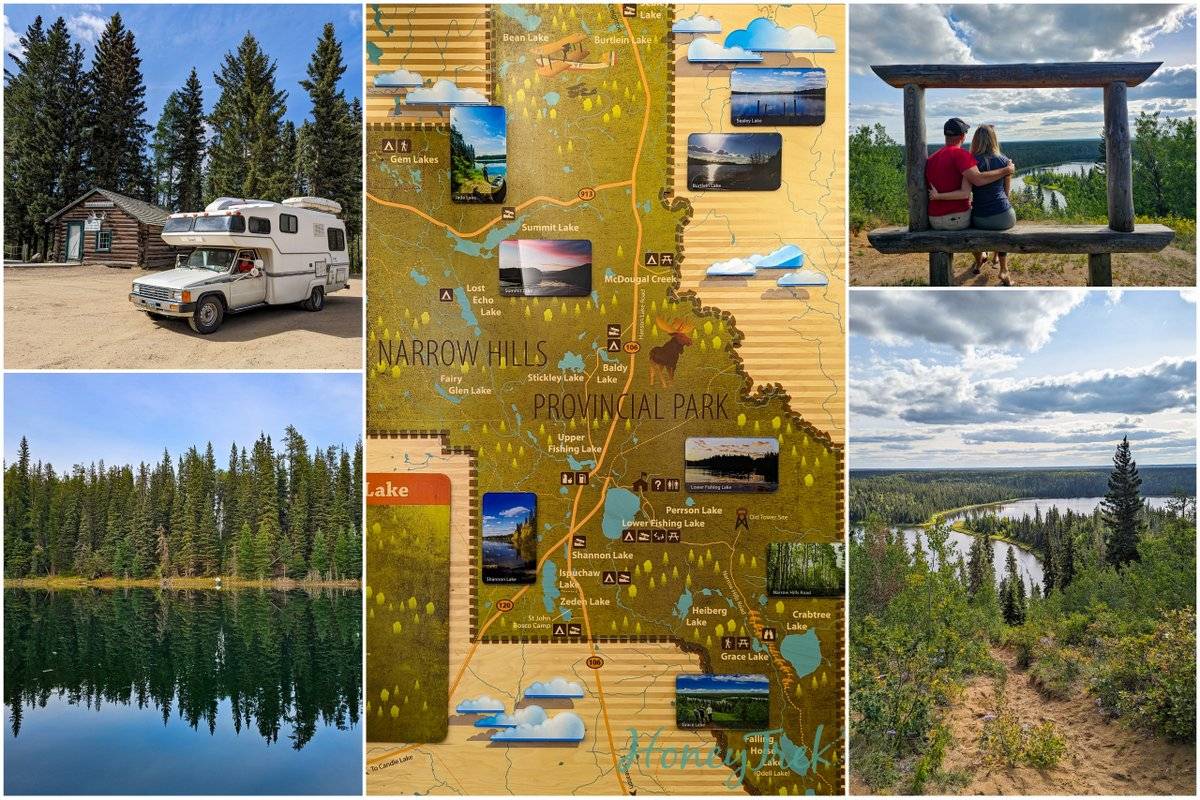
Uniquely shaped by the last glacial period, Narrow Hills Provincial Park has dramatic features like eskers, kettle lakes, and boreal forest (an ecosystem that’s becoming rarer, with only 10% under protection across Canada). The provincial park is spread out and most of its 53,000 acres are left wild with few paved roads and little tourism infrastructure.
A visit to the park office set us in the right direction, with paper maps and the suggestion to drive the Narrow Hills Scenic Drive. Created by a continental ice sheet 10,000 years ago, this push moraine rises 180 feet above the surrounding lakes and is only 16 feet across in some spots, making for a roller-coaster ride! The 19km road finishes at a beautiful vista point over Grace Lakes, with a bench and rustic selfie frame to capture its unique S-curve shape.
Gem Lakes
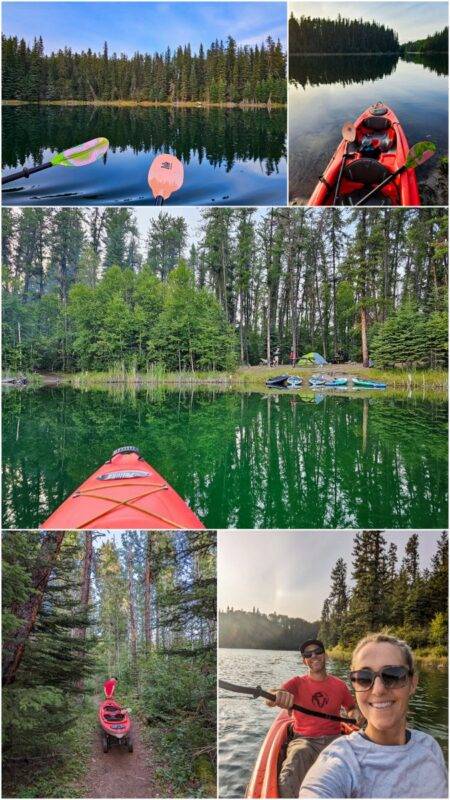
@honeytrek The Gem Lakes. Emerald, Opal, Pearl, Sapphire…a total of 7 radiant bodies of water connect by trail and paddle in the north of Saskatchewan. If you haven’t noticed, kayaking is one of our favorite things, so we jumped at the chance to hit multiple lakes in an evening…especially when Narrow Hills Provincial Park gives you a kayak cart for painless portages! Hop a board, and keep your eye out for beavers and hidden gems! #exploresask @Tourism Sask #partner #kayaking ♬ original sound – HoneyTrek
On the northwest side of Narrow Hills Provincial Park, lies the incredible Gem Lakes. Emerald, Opal, Pearl, Sapphire…a total of seven radiant bodies of water are connected by trail and paddle. With sandy bottoms, these lakes truly glow in gem tones and they feel all the more precious with few other people and abundant wildlife, like moose, beaver, loon, and even lynx! As I’m sure you’ve noticed, kayaking is one of our favorite things, so we jumped at the chance to hit multiple lakes in an evening…especially when this Saskatchewan provincial park gives you a kayak cart at each takeout for painless portages!
Starting at Jade Lake, we continued to Little Jade, Opal, and Sapphire Lakes in just three hours. We could have easily hit up Diamond and the Pearls for a seven-lake circuit, but instead of racing around before dark, we enjoyed the serenity of this place with a sunset picnic. Don’t have a kayak? There is a 5.5-kilometer hiking trail that connects The Gems.
Prince Albert National Park

Zigzagging across dirt roads of the wild North Sask, we reached the largest protected wilderness area in the province…Prince Albert National Park. Where boreal forest and aspen parkland meet, the park has incredible biodiversity amongst its three major lakes, rivers, bogs, and forests, bringing bison, elk, and carnivorous plants! It is the traditional home and cultural gathering place for the Cree, Dakota, Dene, Lakota, Nakota, and Metis peoples.
The First Nations were not consulted when the park was founded in 1927, despite previous treaty agreements. What we greatly respect about modern-day Parks Canada is that they don’t try to hide their wrongdoings, they lay them out on placards with sincere apologies and a commitment to do better. First Nations members have been given an area of the park for their cultural and economic benefit, and are the leads on many activities and exhibits. And from everything we’ve seen in progressive Saskatchewan, it will only get better.
The Town of Lake Waskesiu
Prince Albert National Park is anchored by the quaint town of Lake Waskesiu. Being a beloved getaway for the people of Saskatoon, it has a lake resort vibe with cute cafes, art galleries, tennis courts, lawn bowling, and a lovely promenade. There are beautiful 1920s buildings like the Nature Centre and Waskesiu Heritage Museum…both worth a visit to learn about the area.
Hiking Prince Albert National Park
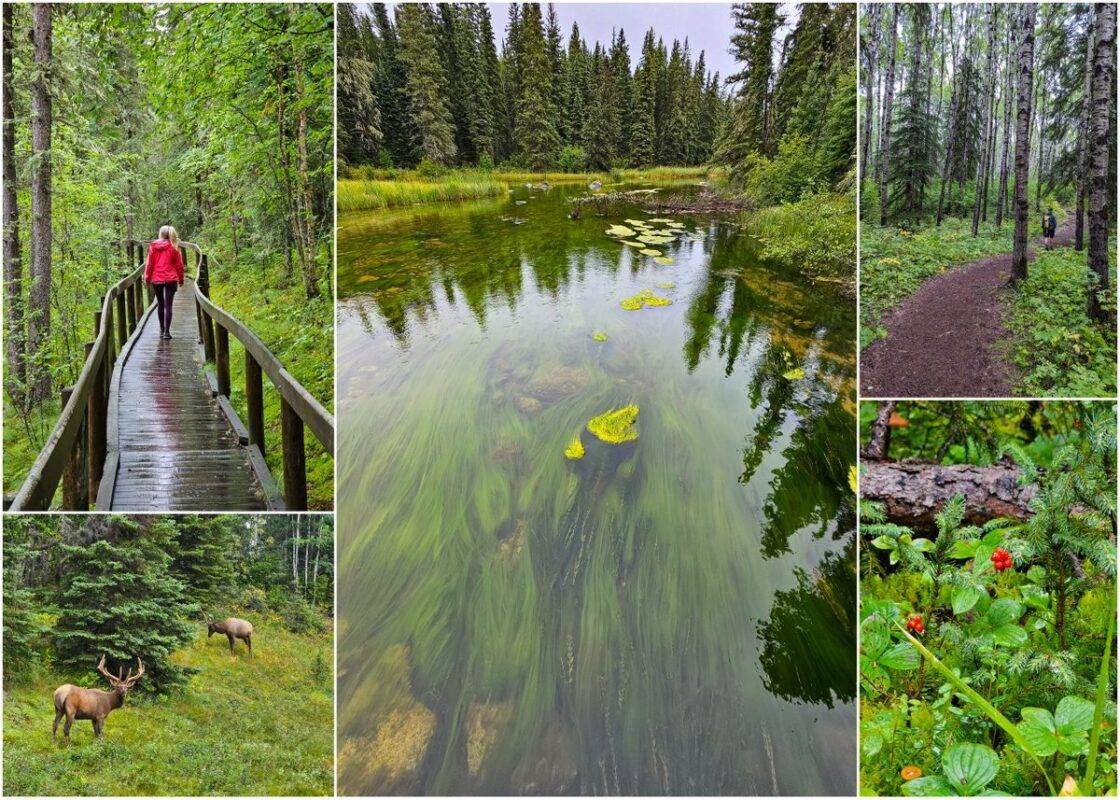
There are over 150 kilometers of hiking trails within the park, with 17 routes to choose from. We started with the Waskesiu River Trail. It begins on a boardwalk hovering over the forest floor, then crosses over a wide river for a chance to spot kingfishers, otters, and great blue herons. Neon green moss flowed like a mermaid’s hair and had us mesmerized.
Some hikers turn back here but continue along the 2.5km loop and the forest of aspen and spruce rolls into gentle hills, carpeted in bunchberries (which are pretty yummy BTW). On our drive deeper into the park, we saw a huge elk, then another, and another! Apparently, when it gets cooler, they can even be found wandering the beach in town!
We stopped at the Narrows Peninsula Trail, a finger sticking out into the Waskesiu Lake. Its thick forest shelter was a common camping spot for the First Nations and a trading post in the 1880s. The weather was not in our favor that day, but we could still appreciate the tunnel of trees, beaches, and ever-changing views of the lake. If you like an epic kayaking-hiking-camping adventure, head to Grey Owl’s Cabin, the former home of the famed conservationist and author by the same name. It’s a three-hour paddle across Kingsmere Lake with a super unique one-kilometer portage made easy with an old railcar!
Beaver Creek Campground & oTENTiks
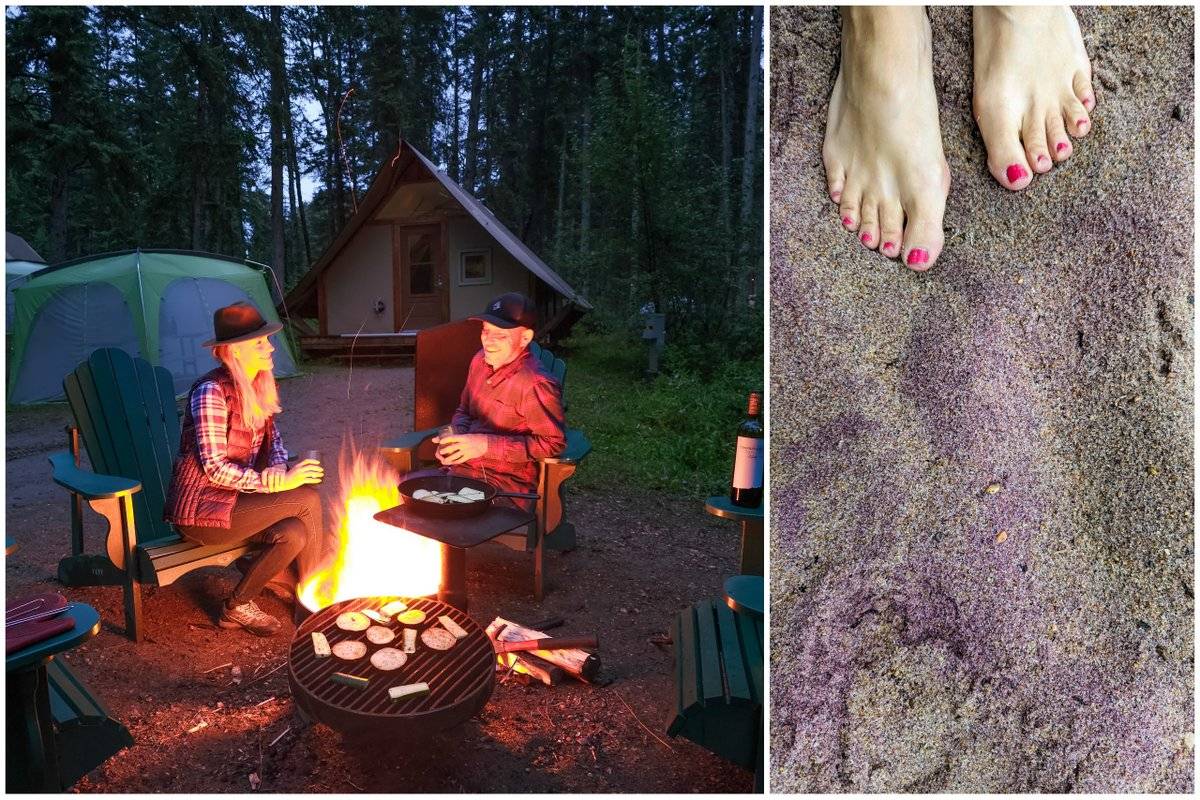
We stayed at Beaver Creek Campground, just a couple minutes from town and with lakeshore access. It’s a big campground, but opt for an oTENTik and you’ll be in a serene 10-tent glamping camp! Parks Canada has added these A-frame-meets-safari-tents to their parks to make camping more comfortable and accessible. (We love oTENTiks so much, we gave them a shout-out in Comfortably Wild)!
Our site had a screened-in dining area, a firepit with Adirondack chairs, and a wall tent that could sleep six (BYO bedding). We cooked out on the grill, roasted s’mores, and slept like babies on their comfy beds. Definitely try to reserve an oTENTik on any of your Parks Canada Trips; these hybrid tents are just the beginning of their creative accommodations!
HoneyTrek Tip: Hike to the end of Beaver Creek’s dog beach and you’ll find purple sand made of ancient crushed granite!
Manitou Beach & The Dead Sea of Canada
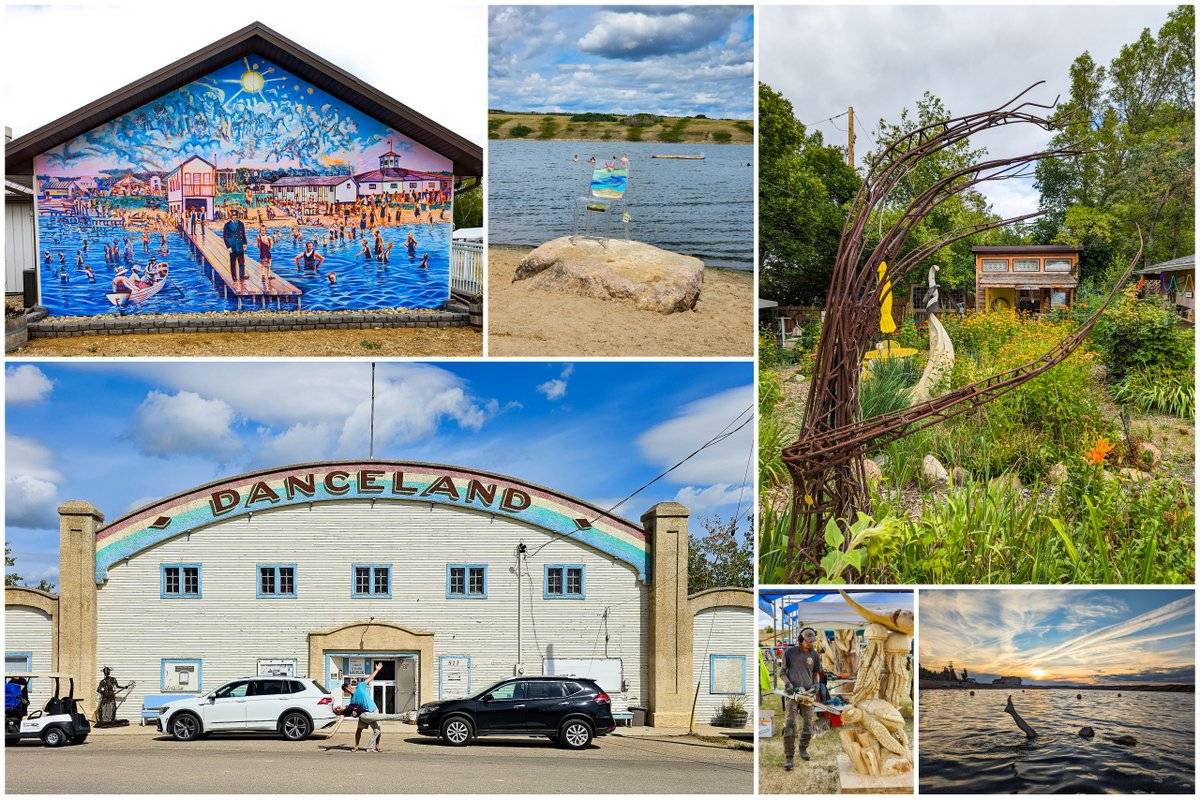
Five times saltier than the ocean and half that of The Dead Sea, Little Manitou Lake has a similar spa-like appeal. In their 1920s heyday, the thrill of the buoyancy and nourishing minerals of the lake made this central Saskatchewan town the hottest destination in the prairie provinces and a rival to Banff Hot Springs. Manitou Beach was lined with bathhouses, dance halls, ice cream parlors, pleasure cruises, and hotels ready for thousands of vacationers. The Great Depression dimmed the spotlight on Manitou, but its natural wonders, retro charms, and fun-loving spirit are still very much intact.
Danceland and its world-famous horsehair dance floor have been rocking for 95 years. The drive-in still fires up films every weekend. And Manitou Springs Resort keeps the pools piping hot for a soak well into the night. The town of Watrous/Manitou Beach may only have a couple hundred residents but they dream big. On the weekend we visited, there were two big festivals going on: the Manitou Beach Chainsaw Carving Festival (the only one in the province) and the Chairs on The Beach Festival of sculpture, music, and fashion (watch our quick video).
On any given day, the Little Manitou Art Gallery has 300 Sask-inspired artists’ work on display, Mike’s Beach Bar will be hopping, and swimmers will be splashing around in the saltwater lake. We got swept up in the energy of this town and extended our stay because we were having so much fun!
HoneyTrek Tip: Take a sunset dip in the lake, wrap up in a towel, and walk across the street to Manitou Springs Resort for a hot soak…they are open until 10 pm and it’s the most relaxing way to end a day.
Regina, The Capital of Saskatchewan
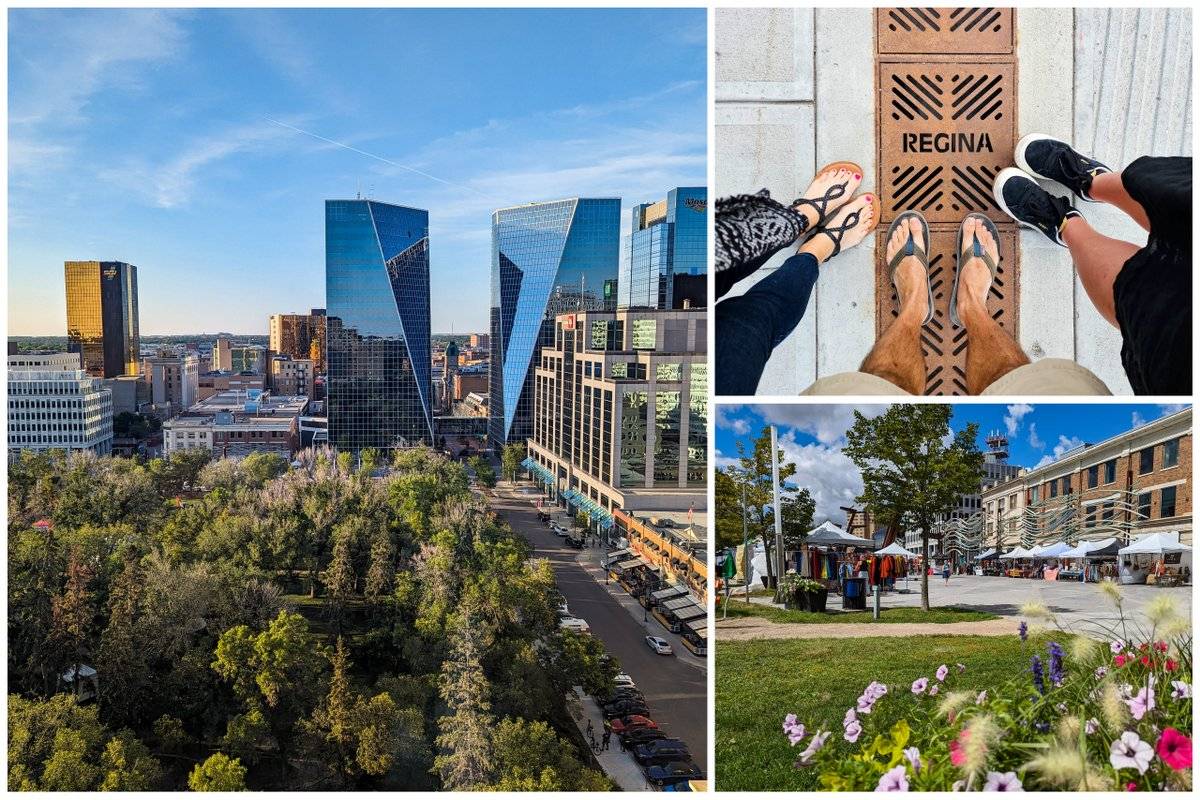
Our Saskatchewan road trip brings us to the capital! The city of Regina emerges out of the prairie with skyscrapers, lush parks, and a lot of heart! Regina became the province’s first capital in 1905 but really hit its stride in the 1920s when wheat prices soared and Sask became one of the richest places per capita in the world, and lavish construction followed. Downtown Regina is centered around the lovely Victoria Park and City Square Plaza, where craft fairs, farmers markets, restaurants, and the iconic Hotel Saskatchewan call home.
Hotel Saskatchewan

We checked into Hotel Saskatchewan, built by the Canadian Pacific Railroad in 1927 to welcome the world to Regina in style. We walked in and the high ceilings had crown molding, crystal chandeliers, and a gilded train-station clock. Marriot Autograph Collection renovated the hotel in recent years, perfectly balancing its original character with contemporary style. Our suite was quite lavish, fit for rockstars and royalty…and as a result, this is exactly where they stay! The Queen of England, Rolling Stones, Snoop Dogg, Justin Trudeau, and more A-listers have made Hotel Saskatchewan their Regina home away from home.
When five o’clock struck, it was time to head to Circa 27 Lounge for the daily whiskey toast to the prohibition-era moonshiners that kept the drinks flowing in the hotel’s early years. We stayed for a Smoked Old Fashion (literally blowing smoke rings), a Saskatchewan Grain Bowl with honey cider vinaigrette, and a chocolate ganache cake by the fireplace. We typically don’t dine at hotels for multiple meals but the food and setting were so good, we kept coming back!
HoneyTrek Tip: Tap into that old-school style by dropping a postcard down Hotel Sask’s brass mailslot from your floor and get your shoes shined by local legend Mr. Bowes, making guests look spiffy for the last 40 years!
Wascana Centre
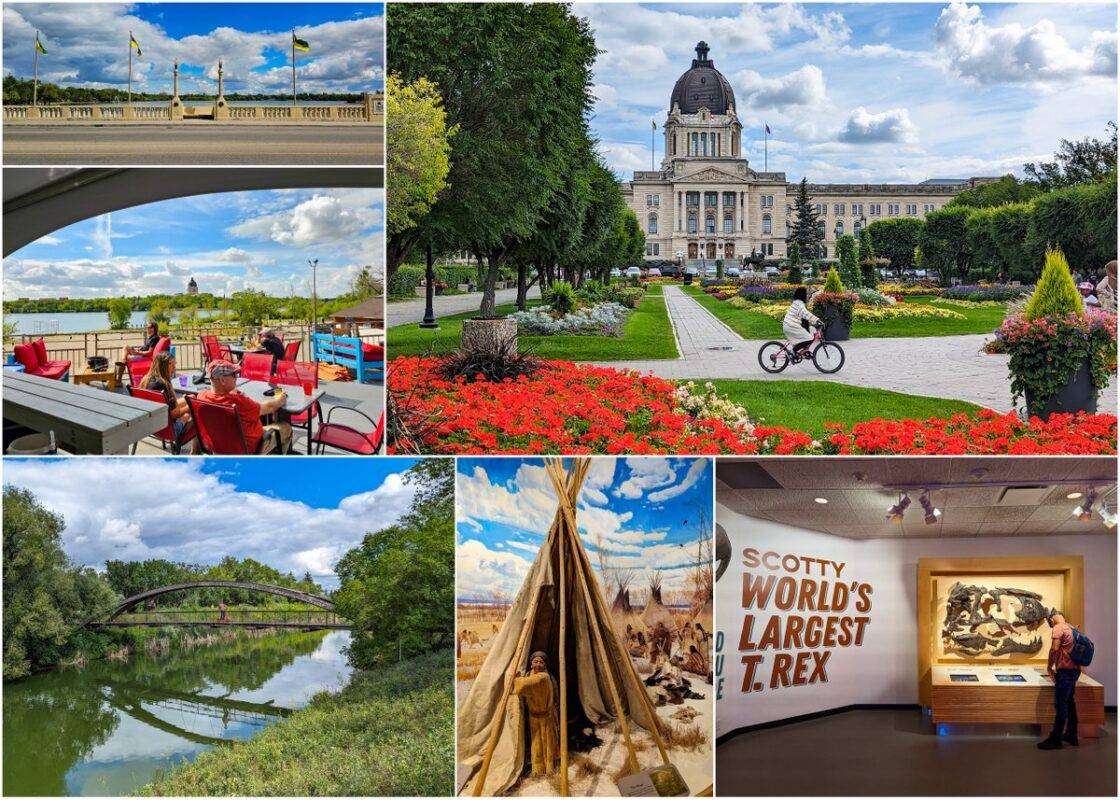
Being the provincial capital and headquarters of the Royal Canadian Mounted Police, downtown Regina is more for business and Wascana Centre is where the locals go to play. One of the largest urban parks in North America at 2,300 acres with a 150-hectare lake in the middle, it’s an outdoor recreation dream. Not only does it have extensive trails, gardens, waterways, playgrounds, and swimming pools, but it also has three major museums and hosts 400 events a year. To explore a park of this size in a day, we rented e-scooters to cruise around the forest and lakeshore! We loved being in the flow with local bikers and runners and getting into the active spirit of the city.
We made the essential Wascana Park stop at the Royal Saskatchewan Museum, the province’s premier natural history museum and home of Scotty, the world’s largest T-Rex ever discovered! The museum gave great insight into Saskatchewan’s First Nations people, Canada’s complex treaty system, the province’s varied ecosystems, and paleontology wonders (more on that in the Grasslands section).
Regina Folk Festival
@honeytrek What an inspiring festival! 52 years strong, The Regina Folk Festival has evolved into a wide range of music styles and a beacon of inclusivity. Honoring that the Saskatchewan capital is on Treaty 4 land, home of the Nêhiyawak, Dakota, Nakota, Lakota, and Métis, Indigenous voices were central to their stage and ethos of sustainability. From headliners like Halluci Nation to Mohawk singer-songwriter Logan Staats, we were exposed to so many awesome bands, unafraid to shake things up and rock out. #exploresask @Tourism Sask #partner #reginafolkfestival ♬ original sound – HoneyTrek
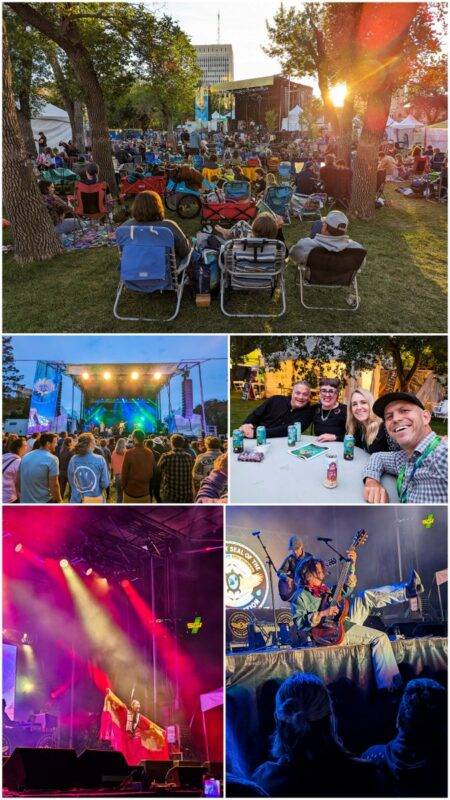
We planned our Saskatchewan road trip around this annual festival…and it was so worth it! Going 52 years strong, The Regina Folk Festival has evolved into a wide range of music styles and a beacon of inclusivity. The 2023 theme was “The Web of Life: Music and Community in Harmony with the Earth,” and they honored this with First Nations’ voices, sustainable practices, and cultural exchange. Being on Treaty 4 land, home of the Nêhiyawak, Dakota, Nakota, Lakota, and Métis, Indigenous groups were given center stage.
From headliners like Halluci Nation to Mohawk singer-songwriter Logan Staats, we were exposed to so many awesome bands, unafraid to shake things up and rock out. The diverse acts like Allison Russell, with her soulful all-women-of-color band, blew us away! By day, free performances and workshops made sure anyone could participate. In addition to this big annual event, the Regina Folk Festival hosts multiple concerts throughout the year and an outreach program that brings their acts to underserved areas. No matter when you take your Saskatchewan road trip, check out RFF!
Foraging Saskatchewan
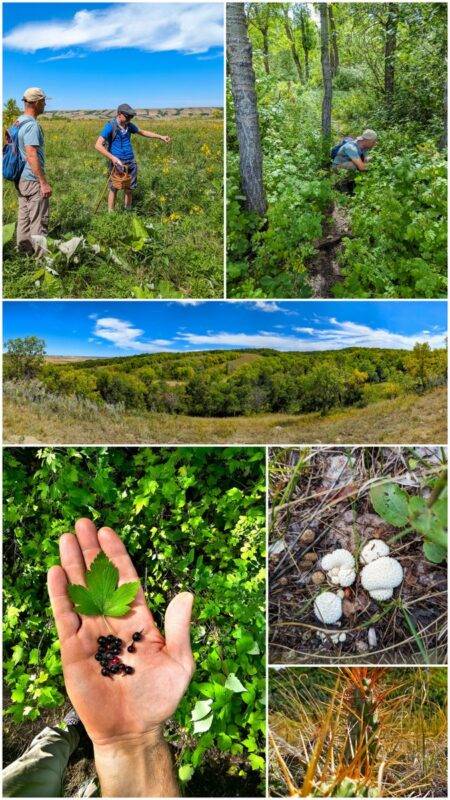
We’ve gotten really into wild foraging in recent years and Saskatchewan is into it too. There were a slew of local specialists offering workshops throughout the province, including the fantastic YQR Naturalist in Regina. We signed up for David’s all-day tour…visiting three different nature areas, each with their own specialty. We met up at White Butte Trails, a popular cross-country ski area, and it was covered in wildflowers and edible delights like puff-ball mushrooms, chokecherries, broad-leaf plantain, sage, and more. David offered great insights, particularly as a third-generation Ukrainian-Canadian, a group that helped settle Saskatchewan and whose culture has left a strong imprint on the province’s cuisine and traditions. (Perogies and borscht are typical Sask dishes. Yum!)
Our next stop was Fairy Hill in the Qu-Appelle Valley, an oasis of wetlands, riparian slopes, and upland grasses. The focus of this foraging session was harvesting tea ingredients, like raspberry leaves, currants, and northern bedstraw (a cousin to coffee with a nice hit of caffeine). We ended at the exceptionally scenic Hidden Valley Refuge with its golden hills, snaking river, and cactus (the farthest north you can find them on the continent!) Here, we harvested prickly pears and our new favorite…skunkbush berries! Dry these little guys and sprinkle them on your food for a lemony pepper flavor. Part hiking trip, part food tour, part botany lesson…this was a fantastically multi-dimensional tour of greater Regina!
Rosetown Farmstay
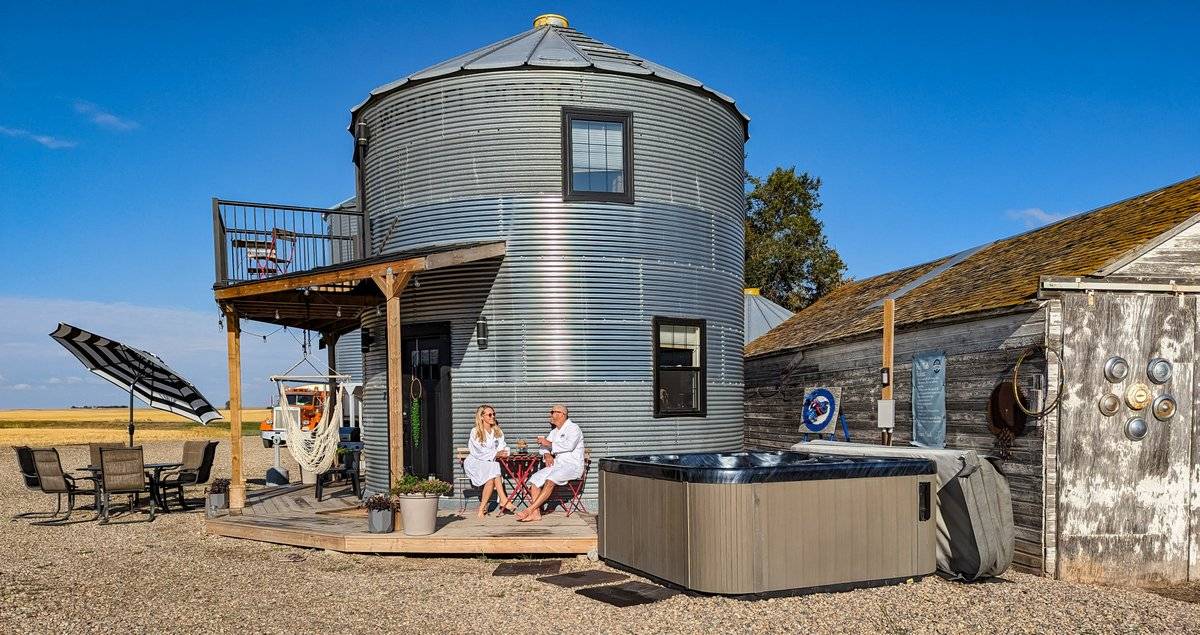
Glamping in a grain bin on a wheat farm? You know we had to add that to our Saskatchewan road trip! The owners of Alive Sky Lodge (April & Darryl) grew up on nearby Rosetown farms and were high school sweethearts. When they reconnected later in life, their creative juices got flowing. They realized the farm that Darryl’s uncle homesteaded in 1903, with its original barn and amber waves of grain, was a place tourists would love with a little added flair. Taking grain bins that were lying around after years of holding lentils, flax, and wheat, they renovated them into charming suites in the round.
Bincredible Glamping
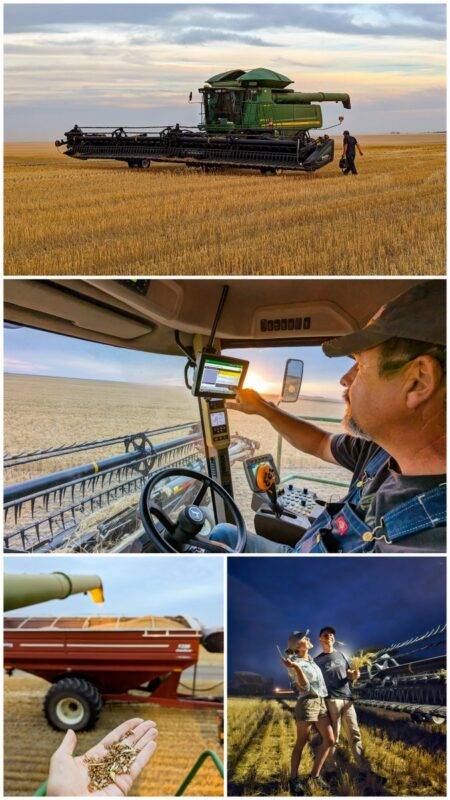
We stayed in the Boho Bin, a pair of silos welded into a two-story penthouse, with a chic living space, multiple balconies, a fire pit, and a hot tub overlooking the working farm. And when we say “working,” this place was a fascinating whirl of activity. Being harvest time, truckloads of grain would pour down the chute into the bins right next to us. We could have been happy just watching that process, then the door of an 18-wheeler swung open, and chief farmer Darryl said, “I’m heading out to harvest. You guys want to join?”
We jumped at the opportunity, not just to ride in a big rig, but also to roll in a million-dollar combine harvester! Climbing up into this John Deere behemoth and driving above the tall rows of wheat, it was amazing to see the fields go from whispy stalks to billions of tiny grains filling our hopper in a matter of minutes.
Watch us take a turn on the combine, feed the chickens and goats, tour our silo suite, and see all the fun at this next-level farmstay.
Fun Fact: Saskatchewan supplies more than a third of the world’s durum wheat and is the world’s top exporter of lentils and dry peas! Vegan heaven!
Lake Diefenbaker: The Great Lake of Saskatchewan
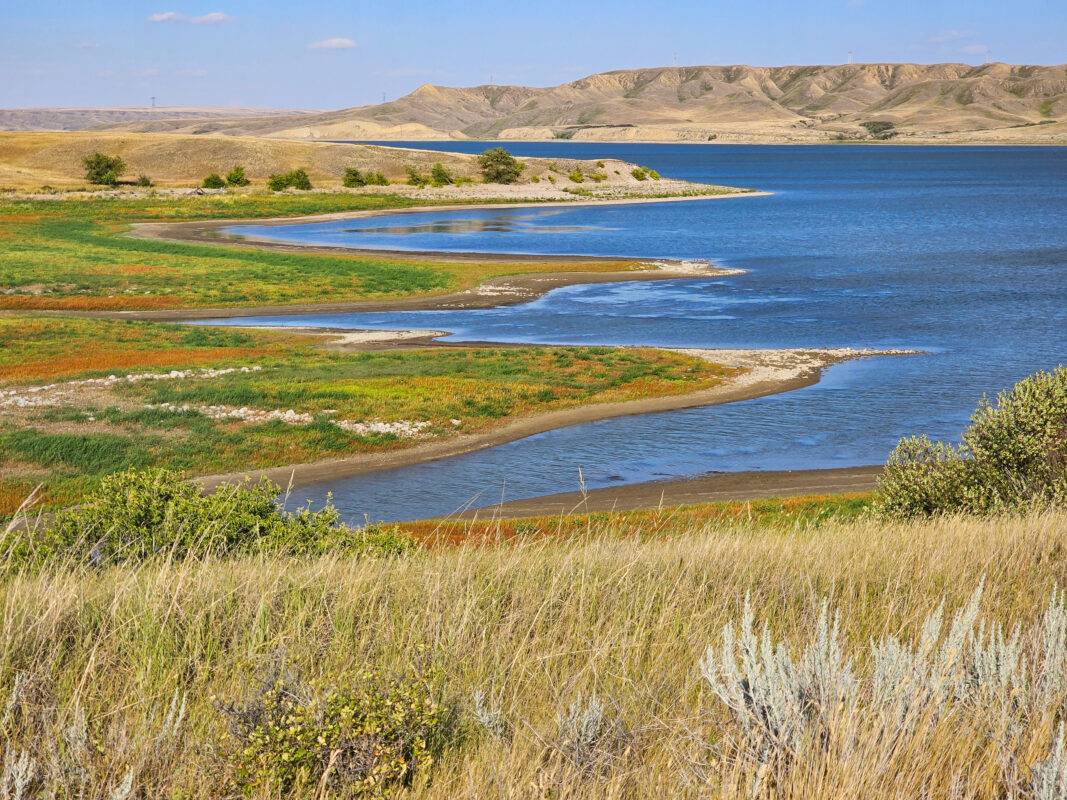
Encompassing three Saskatchewan provincial parks and 800 kilometers of shoreline, Lake Diefenbaker earns the title “The Great Lake of Saskatchewan.” We started at Douglas Provincial Park to check out the Elbow Dunes…yes, sand dunes! At first, they look like hills, but look below the needle and thread grass, blue grama, and pincushion cactus, and they are glacially deposited dunes! Keep going and the vegetation disappears and the golden sand reigns.
Two hours away, on the west side of the lake, is Sask Landing Provincial Park…our favorite part of Diefenbaker! We drove to the end of the road and did an uncharted hike along the water then up into the rippled hills. The snaking shoreline, just past the Goodwin Interpretive Centre, is stunning so don’t miss this short but beautiful loop trail!
Grasslands National Park

Badlands, bison, dinosaur fossils, dark-sky status, and one of the world’s most endangered ecosystems…this is Grasslands National Park. Their wide open prairie has long been used for ranching, but with a closer look at their 70 species of grasses, rare wildlife, and complex ecosystem, they realized it was disappearing fast and needed protection. Not to mention, this is one of the largest culturally intact landscapes with over 10,000 years of human history! Among the grasses, there are 12,000 tipi rings and 3,000 pre-contact cultural resources like cairns and bison drive lanes, showing this region’s vibrant First Nations heritage. In 2001, Grasslands became a national park, and it continues to expand its boundaries for further conservation!
We took three days to explore the East and West Blocks of this two-part park, following the informative Ecotour Scenic Drive, cruising the Badlands Parkway, hiking the network of trails, and wildlife watching at every turn. Though the biggest highlight? The fossils!
Fossil Fever: A Dino-lovers Dream!
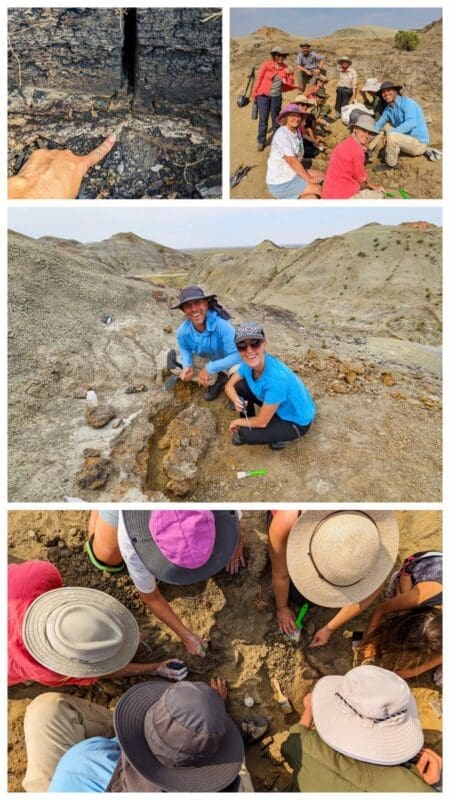
Grasslands is a premier fossil site in North America, one so well preserved you can literally put your finger on the K-Pg boundary line that marks the end of the dinosaur era with an ashy layer from the asteroid’s destruction and where life began again.
With chisels and brushes in hand, we set out with Dr. Emily Bamforth and The Royal Saskatchewan Museum’s team of paleontologists and helped unearth a Triceratops, cast an Ornithomimus, and collected hundreds of vertebrate fossils to further the research of this prehistoric world. This annual event takes place for five days every August and we cannot recommend it highly enough…so tell any dino lover you know to sign up for Fossil Fever well in advance!
Saskatchewan Road Trip for the Win
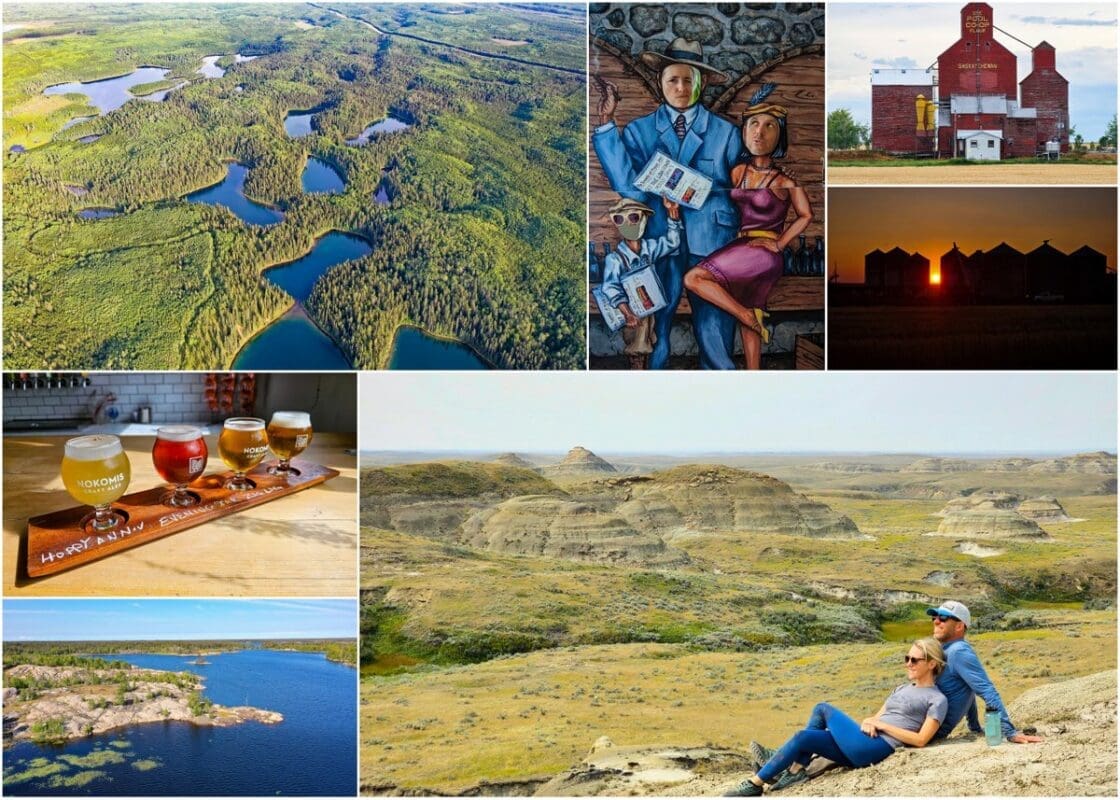
If you’ve ever asked yourself, is there anything worth seeing in Saskatchewan? Now you know. This province is highly underrated! We love Canada, and to understand this gorgeous country you need to experience its diversity of landscapes and the prairie is a big piece of the puzzle. Road-tripping into the boreal forest of the north, the Breadbasket of Canada in the middle, and the badlands of the south, made us realize the diversity and wonders of Saskatchewan!
Many thanks to Tourism Saskatchewan for inviting us to their province and supporting our Saskatchewan road trip storytelling! To show our gratitude and continue our HoneyTrek Cares initiative, we’ve donated to Canadian Parks and Wilderness Society for their Saskatchewan grassland conservation, Regina Folk Festival’s non-profit for strengthening community through music, and the Aboriginal Friendship Centres of Saskatchewan for their work in supporting urban First Nations members and their reconciliation efforts for the province as a whole.
To further plan your trip, check out TourismSaskatchewan.com and drop any questions in the comments. Happy to help…we ❤️ Saskatchewan!



